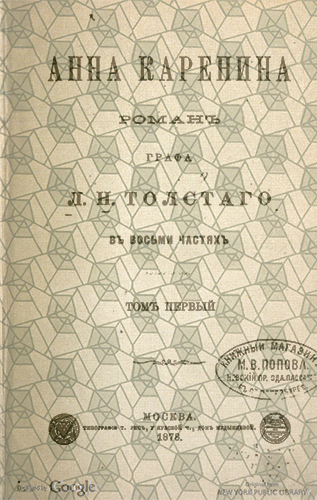
Leo Tolstoy’s literary work Anna Karenina first appeared as a series in the Russian journal Russkii Vestnik from 1873 through 1877.[1] It was published in Moscow in its book form in 1878. Considered the supreme masterpiece of realist fiction, Vladimir Nabokov called Anna Karenina “one of the greatest love stories in world literature.” Matthew Arnold claimed it was not so much a work of art as “a piece of life.” Set in imperial Russia, Anna Karenina is a vibrant and complex meditation on passionate love and disastrous infidelity. It is also a work of exquisite patterning, draped around the stories of two protagonists who meet only once in the course of the text. The first English edition was published in 1886 in New York by Thomas J. Crowell & Co and translated by Nathan Haskell Dole.
The Slavic collections at the UC Berkeley Library represent a significant treasure trove of material, the product of a century and a half of devoted, attentive collecting. The Library’s Slavic collection is easily the strongest on the West coast, and, indeed, Berkeley probably takes a back seat in this area only to Harvard’s Widener Library and the Library of Congress.
Russian has been taught at Berkeley since 1901, and The Slavic Department has been in existence for over a century. Berkeley was the location of the founding of the first chapter of Dobro Slovo, a national honor society for students of Slavic Languages. The Department has been fortunate to be the home of many exceptional scholars, including Czeslaw Milosz, the University’s only Nobel Prize winning professor in the Humanities. In the most recent report commissioned by the Association for Slavic, East European, and Eurasian Studies (ASEEES) to assess the state of research and graduate training in U.S.-based academic institutions, Berkeley’s graduate program was ranked as the top program in the country, followed by Harvard, Columbia and Princeton.
The Department of Slavic Languages and Literatures at UC Berkeley has several scholars whose specialization is 19th-century Russian literature including Professors Eric Naiman and Irina Paperno. Professor Paperno’s book on Tolstoy Who, What am I?” Tolstoy Struggles to Narrate the Self has been instrumental in providing insight into the world of Tolstoy.[2] Professor Harsha Ram has further provided a glimpse of interactions between Russia’s both European and Asian roots in his essay on prisoners of the Caucasus in the anthology Tolstoy’s Short Fiction: Revised Translations, Backgrounds and Sources, Criticism edited and with revised translations by Michael R. Katz.[3]
Contribution by Liladhar Pendse
Librarian for East European and Central Asian Studies, Doe Library
Eric Naiman, Professor
Department of Slavic Languages and Literatures
Sources consulted:
- Russkīĭ vi︠e︡stnik. Moskva: V. tip. T. Volkova. (HathiTrust Digital Library) Print edition held in Main Stacks/NRLF.
- Paperno, Irina. Who, What am I?” Tolstoy Struggles to Narrate the Self. Ithaka, NY: Cornell University Press, 2014.
- Tolstoy’s Short Fiction: Revised Translations, Backgrounds and Sources, Criticism. Edited and translated from the Russian by Michael R. Katz. New York: Norton & Co., c2008.
~~~~~~~~~~
Title: Anna Karenina
Title in English: Anna Karenina
Author: Tolstoy, Aleksey Konstantinovich, graf, 1817-1875.
Imprint: Moskva: Tip. T. Ris, 1878.
Edition: 1st
Language: Russian
Language Family: Indo-European, Slavic
Source: HathiTrust Digital Library (New York Public Library)
URL: https://catalog.hathitrust.org/Record/008614462
Other online editions and resources:
- Anna Karenina / L.N. Tolstoĭ; pod redakt︠s︡īeĭ i s primi︠e︡chanīi︠a︡mi P.I. Biri︠u︡kova; s ris. M. Shcheglova, A. Moravova i A. Korina. Moskva : Izd. T-va I.D. Sytina, 1914.
- Anna Karénina: In Eight Parts by Count Lyof N. Tolstoï, Translated by Nathan Haskell Dole. New York: T.Y. Crowell & Co., ©1914.
- Anna Karenina by Leo Tolstoy; introduction and notes by E.B. Green. Hertfordshire [England]: Wordsworth Editions Ltd, 2011.
- An article about the new translations of Anna Karenina was published in the NY Times. https://www.nytimes.com/2014/12/28/books/review/new-translations-of-tolstoys-anna-karenina.html (accessed 7/9/20)
Select print editions at Berkeley:
- Anna Karenina / L.N. Tolstoĭ; pod red. i s primi︠e︡chanii︠a︡mi P.I. Biri︠u︡kova; s ris. M. Shcheglova, A. Moravova i A. Korina. Moskva: Izd. T-va I.D. Sytina, 1914.
- Anna Karenina: Backgrounds and Sources Criticism / Leo Tolstoy; the Maude translation revised by George Gibian; edited by George Gibian. New York: Norton, c1995.
- Many other English translations are also available through OskiCat.
The Languages of Berkeley is a dynamic online sequential exhibition celebrating the diversity of languages that have advanced research, teaching and learning at the University of California, Berkeley. It is made possible with support from the UC Berkeley Library and is co-sponsored by the Berkeley Language Center (BLC).
Follow The Languages of Berkeley!
Subscribe by email
Contact/Feedback
ucblib.link/languages
![The Languages of Berkeley [fan]](https://update.lib.berkeley.edu/wp-content/uploads/2019/02/fan_languages-450px.jpg)